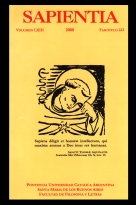Please use this identifier to cite or link to this item:
https://repositorio.uca.edu.ar/handle/123456789/4720| Título: | Hacia una ética de la responsabilidad: Derrida y el otro “por venir” en Lévinas | Autor: | Madrid, Raúl | Palabras clave: | Derrida, Jacques, 1930-2004; Levinas, Emmanuel, 1906-1995; DECONSTRUCCION; ETICA; ALTERIDAD; YO; OTRO | Fecha de publicación: | 2008 | Editorial: | Pontificia Universidad Católica Argentina. Facultad de Filosofía y Letras | Cita: | Madrid, R. Hacia una ética de la responsabilidad: Derrida y el otro “por venir” en Lévinas [en línea]. Sapientia. 2008, 63 (223). Disponible en: https://repositorio.uca.edu.ar/handle/123456789/4720 | Resumen: | Resumen: La tesis del trabajo es que la deconstrucción entraña en sí misma una actitud ética, y que ésta radica intrínsecamente en su apertura al otro y en la responsabilidad frente a ese otro. Para ello, se intenta en primer lugar una elucidación del concepto, caracterizándola como un protocolo de lectura compuesto de dos fases: des-sedimentación y reinscripción, siendo este último momento el que la identifica como una lectura singular y no universalizable. Posteriormente, a través de las nociones de “sujeto” y “alteridad del texto”, se muestra cómo las bases de la ética deconstructiva giran en torno a las nociones de “yo” y “otro”, conceptos que Derrida, como se demuestra, toma de Lévinas. La instancia ética es la apertura al otro, que se verifica por la responsabilidad que supone concebir al otro como aquello incapaz de apropiación. Dicha responsabilidad configura la aporía ética de lo general-particular, al concebirse como la posibilidad imposible de una opción general que es al mismo tiempo una decisión personal o singular, o, en otros términos, la indecidibilidad entre la norma general y la decisión concreta, que es a su vez la tensión entre “justicia”, “hospitalidad” y “negociación”. Lo anterior demuestra que el acto ético (o acto deconstructivo) tiene la misma estructura de la différance, imbricada siempre en la iteración del significante. Abstract: The thesis entertained in the paper is that deconstruction contains in itself an ethical attitude, and that such an attitude takes root intrinsically in its openness to the other and in responsibility facing him. On that purpose, the paper primarily intends to elucidate the concept of deconstruction, characterizing it as a reading protocol consisting of two steps: des-sedimentation and reinscription, being this last moment the one which identifies deconstruction as a singular, not universalizable reading. Afterwards, through the notions of “subject” and “otherness of the text” it is shown how the very bases of deconstructive ethics are centred on the concepts of “I” and “other”. Derrida, as it is proved on the paper, takes these concepts from Lévinas’ work. The ethical moment is the openness to the other that occurs through the responsibility involved in conceiving this other unable for appropriation. Such responsibility configures the general-particular ethical aporia, which is thought as the impossible possibility of a general option, which is at the same time a personal, singular decision. In other terms, it indicates the undecidability between the general norm and the concrete decision. This tension is, in due time, the tension between “justice”, “hospitality” and “negotiation”. The aforementioned shows that ethical action (or deconstructive action) has the same structure than différance, always involved in the iteration of significant. |
URI: | https://repositorio.uca.edu.ar/handle/123456789/4720 | Disciplina: | FILOSOFIA | Derechos: | Acceso Abierto | Fuente: | Versión original impresa en Sistema de Bibliotecas UCA: Sapientia Vol. LXIII, Nº 223, 2008. |
| Appears in Collections: | SAP - 2008 Vol LXIII nro. 223 |
Files in This Item:
| File | Description | Size | Format | |
|---|---|---|---|---|
| hacia-etica-responsabilidad-derrida.pdf | 275,88 kB | Adobe PDF |  View/Open |
Page view(s)
1,224
checked on Apr 30, 2024
Download(s)
1,647
checked on Apr 30, 2024
Google ScholarTM
Check
This item is licensed under a Creative Commons License

